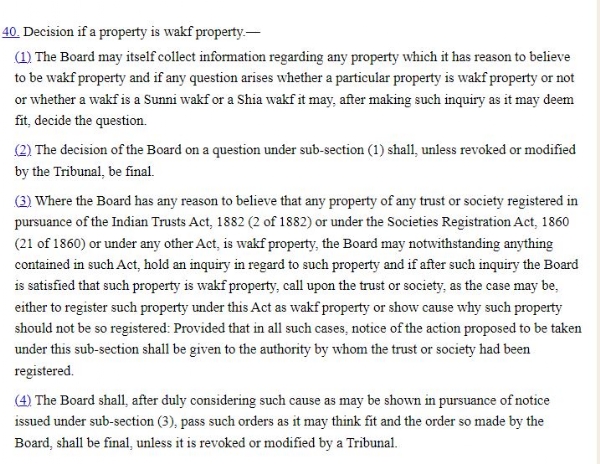“Once a Waqf, always a Waqf”: The Land Grabbing Policy of Islamic Authority
It should be noted that Waqf Board is now the third largest land owner in India after the Armed Forces and Indian Railways.
Total Views |
An alarming incident has come forward when Tamil Nadu's Waqf Board shockingly claimed the ownership of the land of seven Hindu villages including the land of a 1,500-year-old Sundareswarar Temple, in Thiruchendurai. This came after one villager tried to sell his agricultural land to finance his daughter's marriage.
It is pertinent to mention that there was no evidence regarding Muslims residing in the area, and papers proved that resettlement took place in 1927–1928. The report further said that there was no information about Muslims holding property in the area. However, the Waqf Board has written a 20-page letter to 12 registration offices in Trichy, claiming property in numerous districts.
In these circumstances, let us dig into how the Waqf board can claim the ownership of land under the Waqf Act 1995. For that, we need to understand the meaning of Waqf or Wakf and the Waqf Act 1995.
The meaning of Waqf
The literal meaning of the word waqf is 'detention’. Waqf is property given in the name of God for religious and charitable purposes. According to Section 3(r) of The Waqf Act, 1995, the permanent dedication of any movable or immovable property by a person professing Islam for any purpose recognised by Muslim law as pious, religious, or charitable.
In simple words, assume that there is one Muslim man who has two flats. Before his death, he donated one flat to Waqf and after his death, that property belongs to Allah. As per Sharia, this property is now permanently dedicated to Allah, making Waqf irrevocable in nature.
'Once a Waqf, always a Waqf'
More shockingly, though there was no title transfer to any Muslim organisation as per the government, Waqf’s claims that it was a Waqf property from the 1850s mean that it is now forever a Waqf property. It should be noted that Waqf Board is now the third largest land owner in India after the Armed Forces and Indian Railways.
The Waqf Act 1995
The Waqf Act, of 1995 was enacted and implemented on November 22, 1995. The Act introduced the Central Waqf Council, but the Act underwent many amendments (1959, 1964, 1969, 1984) as it contained many hassles.
This act provides for the power and functions of the Waqf Council, the State Waqf Boards, and the Chief Executive Officer, and also the duties of mutawalli. It should be noted that Waqf is not present in all Islamic countries with places such as Turkey, Libya, Egypt, Sudan, Lebanon, Syria, Jordan, Tunisia, and Iraq having no Waqfs.
As per that act, if someone wants to reclaim the land that has been claimed by the Waqf board, they cannot file a plea in a normal court, the person must have to go State Waqf Board.
Waqf Board
The State Waqf Boards are established by the state governments in view of the provisions of Section 9(1) of the Waqf Act, 1954. These work towards management, regulation, and protection of the Waqf properties by constituting District Waqf Committees, Mandal Waqf Committees, and Committees for the individual Waqf Institutions.
Also Read | Villagers show documents proving ownership to counter Waqf Board's claims that land belongs to them
According to Section 14, members of the Waqf Board must be Muslims, be they an MP, MLA, member of the Bar Council, an expert in town planning or management, a scholar in Islamic theology, and not below the rank of joint secretary. There is one central Waqf board and 32 state Waqf boards. It should be noted that properties are managed by Waqf (the equivalent of trust) and state Waqf boards.
As per Article 40 of the act, whether it's your land or Waqf land will be decided by the Waqf board and their decision will be final. Anyone who is unhappy with the decision of the Waqf board can appeal to the Waqf Tribunal relating to Waqf or Waqf property(Section 83).

Waqf Tribunal
The Waqf Tribunals are deemed to be a civil courts and required to exercise all the powers and functions exercised by a civil court under the Code of Civil Procedure, 1908. As per section 85, the decision of a Tribunal shall be final and binding on the parties. No suit or legal proceedings shall lie under any civil court which this act requires to be determined by a Tribunal. Thus, making the Waqf Tribunal decisions above any civil court.
However, later this clause was stuck down by Supreme Court in May 2022. During the hearing of one case, the SC said no court is superior to us and that we can interfere in any decision.
In 2005, the UP waqf board claimed Taj Mahal against ASI, though they lost the case in the Supreme Court the same was observed during the Gyanvapi case, there also they lost.
It should be noted that the special status given to Waqf properties violates article 14 and 15 of the Constitution. Article 14 guarantees equality before the law and equal protection of the law whilst Article 15 prohibits discrimination on grounds of religion, race, caste, sex, or place of birth. A special Act for religious properties of only one religion when no such law exists for any other religion smacks of clear discrimination.

